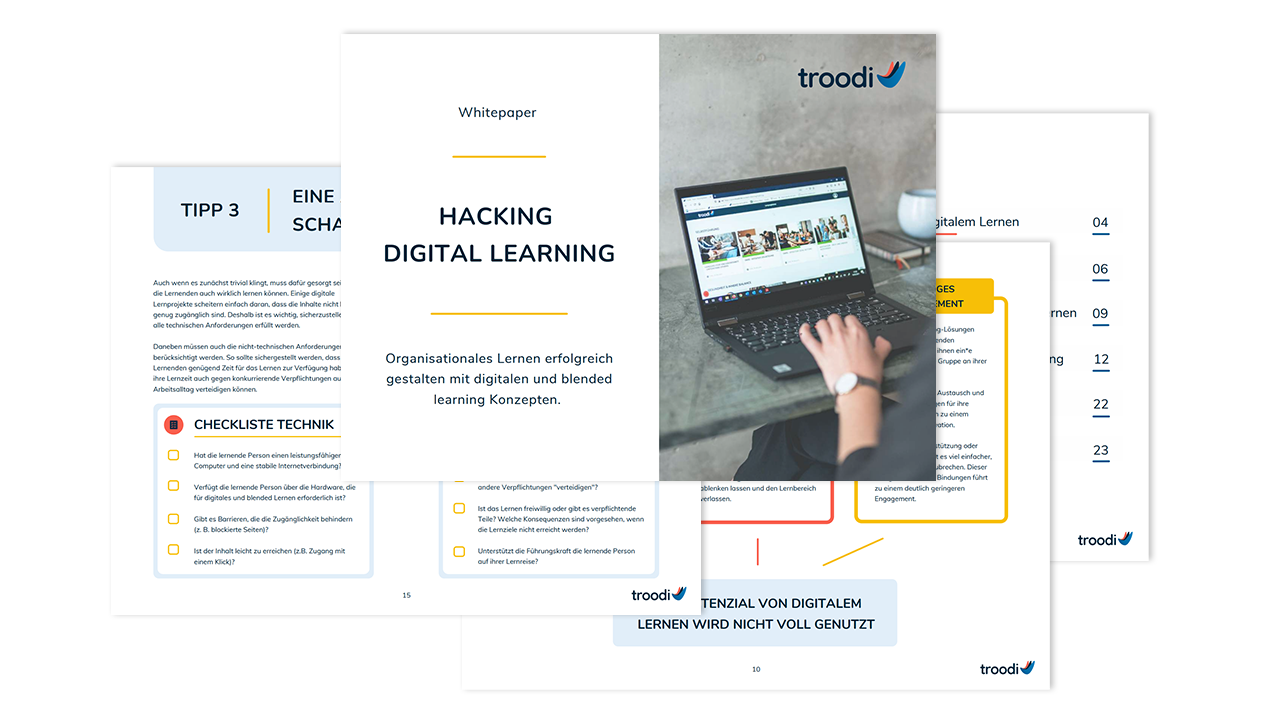Hacking Digital Learning
Whitepaper
The troodi whitepaper “Hacking Digital Learning” identifies the most important success criteria for implementing digital learning.

Digitalization is changing the way we work and learn. More and more organizations want to exploit the enormous potential that lies in digital and blended development measures. However, digital learning projects often fail, which is reflected in low learner engagement and low completion rates.
Whitepaper content
Definition of digital learning
Why we need digital learning in organizations
Challenges of digital learning
8 practical tips for successful implementation
Best practices from several client projects

Get the whitepaper now!
FAQ Digital learning
What is digital learning?
Digital learning involves much more than the technology behind it. It goes beyond the aspect of e-learning and describes a fundamental change in mentality. For us at troodi, digital learning means facilitating development and digital education through the use of digital media and tools.
Digital learning includes a variety of learning formats, from virtual classrooms to learning videos and interactive learning opportunities. This diversity enables learners to learn flexibly and individually tailored to their needs. Not only is learning being digitized, but a new learning culture is emerging that focuses on self-determination and personal responsibility.
This change in mentality means that digital learning is becoming an integral part of modern employee development, going far beyond traditional definitions and permanently changing the way we acquire knowledge.
What advantages does digital learning provide for your employees?
Self-directed learning
Digital learning promotes self-directed learning with the use of interactive learning content and digital learning materials. This enables employees to learn at their own pace and take their professional development into their own hands.
Learning without being tied to a specific location
One major advantage of digital learning is that it is not location dependent. Your employees can learn from anywhere – be it in the office, at home, or on the move. This flexibility of learning location supports a better integration of learning and everyday working life.
Relevance of digital media
Digital media offer innovative learning methods that make learning engaging and effective. Providing digital learning materials enables continuous development and ensures that learners are always up to date.
Inclusive learning
Digital learning is inclusive as it is accessible regardless of physical or geographical restrictions. This promotes equal participation and supports diversity within the company.
Time flexibility in digital learning
Time flexibility in digital learning allows employees to determine their own schedule and learn entirely online. This makes it easier for them to combine learning and professional commitments in the best possible way and promotes sustainable development.
What are the challenges of digital learning?
Lack of orientation
- In many cases, the provided content portfolio is too extensive and learners lose themselves in the number of elearnings – they just do not know where to start (choice overload).
- Constant availability leads to deprioritization (anytime = another time).
- E-learning courses are usually too generic and do not adapt to individual needs.
Low completion rates
- Motivation is high at the beginning, but decreases as there is no sense of urgency.
- Everyday work often interferes with learning, and digital distractions are plentiful.
Low learner engagement
- A lack of mentors and social support reduces motivation.
- Lack of social interaction and rewards leads to low engagement.
Find additional resources on the topic of digital learning
Our whitepaper “Hacking Digital Learning” provides a comprehensive overview of digital learning in HR and people development. The tips help you to successfully design digital learning in your organization and to better deal with challenges that arise. If you would like to dive deeper into the topic, we have put together a selection of further resources. In our troodi blog, we deal with important trends in the HR and LD industry. Get valuable insights into various topics relevant to people development. Our authors provide comprehensive information, practical tips from numerous projects and best practices that will help you in your day-to-day work.
SCORM, xAPI and more: integrating e-learnings into your organization’s LMS
Would you like to provide learners in your organization with e-learning content for their continuing education while maintaining a complete overview?
Then integration into a learning management system may make sense. In this article, you can find out more about the various e-learning standards such as SCORM and xAPI.
Increase learner motivation in digital learning projects
With the shift from traditional learning formats to more self-directed learning, the importance of intrinsic motivation to learn is increasing. Based on Daniel Pink’s motivation model, this blog article describes how people developers can positively influence employees’ willingness to learn in the long run.
E-learning provider comparison: What you should consider for your decision
You work in people development and would like to implement e-learning in your organization? Or would you like to expand your existing e-learning offer? Then you will be faced with the question of choosing one or more digital learning providers at some point. In this blog article, you will find the most important criteria that you can use to decide between different e-learning platforms for corporate learning.



